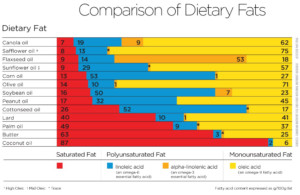Skinny on Fats
Everyone needs some fat in the diet. It’s an important source of energy, a component of cell membranes and a precursor for certain hormones and products of metabolism. Fat also helps the body absorb fat-soluble vitamins (A, D, E and K and beta carotene. However, keeping fat intake within dietary guidelines is important for good health.
In addition, the types of fat in the diet matter as much as the amount. To reduce the risk of heart disease, health authorities advise consuming predominately unsaturated fats within a range of 20 to 35 percent of total daily calories. Unsaturated fats can lower total and LDL cholesterol on their own as well as by replacing saturated fats. Saturated and trans fats should be limited in the diet because they increase total and “bad” LDL cholesterol. In addition, trans fat can decrease “good” HDL cholesterol.
Chart courtesy of CanolaInfo.